
(CNN) —
As the time we spend online continues to increase — especially as remote work has become the norm — it’s even more important than ever for people to protect all the personal data they store across the internet. That’s where a VPN comes in.
A VPN, or virtual private network, disguises your computer, internet activity and data by routing it through a separate server, making it harder for anyone to intercept it.
There are a number of factors that make one VPN better than another, namely the number of servers and how well the VPN handles privacy concerns (which you can read more about below). So to find the best VPN out there, we rounded up the most popular options currently available and consulted Scott J. Shackelford, the cybersecurity program chair at Indiana University Bloomington, for further guidance on our picks. After running the finalists through their paces, we had one clear winner on our hands.
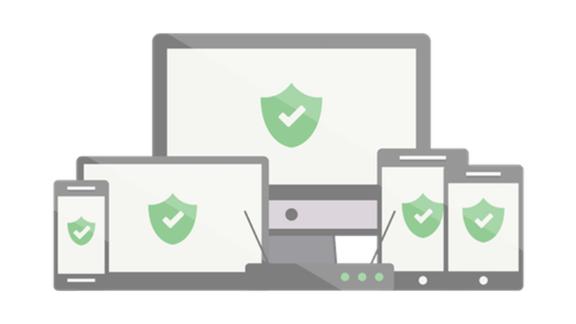
ExpressVPN
PHOTO:
ExpressVPN
A VPN is all about security. And if there are privacy concerns with your VPN itself, well, you might as well not be using one at all. ExpressVPN’s stellar privacy record impressed us more than any other VPN we tested. The company has been running annual independent transparency audits on its service since 2018. Plus, it made its Chrome extension open-source, allowing anyone to inspect the code to ensure the developers aren’t hiding anything from the users. “They try to make privacy the name of the game for their service,” Shackelford says about ExpressVPN.
Aside from its expert handling of privacy concerns, ExpressVPN also impressed us with its performance. For one, you’re not limited to using the service solely on your computer. In addition to PC, Mac and Linux, ExpressVPN is also available for iPhone and Android, smart TVs, Chrome and Firefox browsers and your router itself. You can even set it up on your PlayStation 3 or 4, Xbox One or 360 and Nintendo Switch. It’s rare to see such a huge spectrum of usable devices, and you can use the same account across five different ones, so you should be able to install across all your most-used devices.
ExpressVPN is also a cinch to use. Once you log in, you simply turn it on (with a virtual switch) to connect to the best server available. Connecting takes less than 10 seconds, which was about average among the VPNs we tested. If you want to connect to a specific country rather than the nearest server, you can do so manually. This feature allows users to view content that is otherwise blocked in their country, or to view content that is only available in another country.
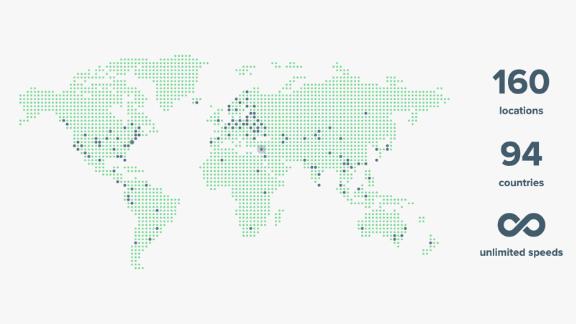
ExpressVPN
PHOTO:
ExpressVPN
Where this VPN truly shone was in the number of services and countries of operation: 3,000 servers in 94 different countries. Although NordVPN has more servers, ExpressVPN covers more countries than any of the others we tested. That’s extremely important — if a ton of people are using a VPN and there aren’t enough servers to go around, users could experience slowdowns. Similarly, if there aren’t any servers in your country, you may have to connect to one that’s far away from you, also hampering speed and usability.
With the VPN switched on, we experienced no noticeable latency when watching videos and browsing the internet. Only when playing a multiplayer online game were there some occasional lags. But that’s by no means a deal breaker, as we experienced the same with a majority of the other VPNs. In rare cases, using a VPN can reduce lag if you connect to a server close to the game’s server, or circumvent a congested server. But a majority of the time, you’re simply giving your connection a longer distance to travel, contributing to lag. That being said, if you’re on public Wi-Fi, it’s worth the security.
In terms of speed, all the VPNs we tested were able to produce 60% to 70% of the download speeds and 40% to 60% of the upload speeds that we measured without a VPN enabled, ExpressVPN included.
Again, one of the most important subjects to pay attention to when using a VPN is privacy, so you need to put in some time investigating to be sure the service won’t take advantage of you. ExpressVPN makes it easy to do just that.
Like most VPNs, ExpressVPN upholds a no-logging policy. In other words, the company states that it does not collect information like traffic destinations and browsing history. It will also refrain from recording your IP address, session duration and other session information. To put these promises to the test, as well as screen for other vulnerabilities, ExpressVPN has been subjecting its service to annual third-party audits since 2018. These have been performed by a cybersecurity firm called Cure53.
After each audit, Cure53 creates a report of its findings, which you can view on its website once you sign up for the service. Anyone, whether they have an account or not, can check out ExpressVPN’s explanation of what is covered by the audit here.
Cure53 also performed an assessment on ExpressVPN’s Chrome extension in 2018, yielding what it described as positive results. It also noted that fixes were made by the ExpressVPN team in response to these results. That report is publicly available here. But that’s not all — ExpressVPN has also open-sourced the code for its browser extension. Thus, the entire code for its extension is open and available for the public to see over on this GitHub page. As Shackelford aptly put it, “That’s a good sign. Totally.”
Overall, ExpressVPN provides a secure VPN service with competitive speed and a solid privacy record. Plus, it’s easy to use and install on a large variety of devices so you can keep your information safe at home and on the go.
We tested the VPNs with the best features and the most buzz. Specifically, we looked at those that were best reviewed, provided the most servers and speed and had a documented good history with privacy.
With each VPN, we started at the beginning by downloading installers and setting up accounts. We then ran each VPN and tested it under various conditions, including running speed tests for more objective measurements. We also looked into the maximum number of devices it could be installed on.
Finally, we read through each VPN’s privacy policy and looked into any privacy conflicts it may be involved in. We also noted whether the companies were taking extra steps to ensure a secure service, such as whether they’ve undergone an independent audit by any cybersecurity firms. Along the way, we talked to Scott J. Shackelford, our expert on the subject of cybersecurity and law, to make sure we were on the right track and to get his opinion on concerns that arose.
- Ease of setup: For every program, there’s a setup. As we installed each VPN and created our accounts, we noted the duration and ease of each setup process.
- Device availability: We looked into which devices each VPN could be installed on. To test some of these out, we installed each VPN on an iPhone 11, a Samsung Galaxy A50 and both a Firefox and Chrome browser, if the service was available on these platforms.
- Number of streams: Seeing as many of us own at least a handful of tech, it’s important to us that a VPN covers more than just a single device. We checked out the maximum number of devices upon which each VPN could be installed.
- Number of servers: Major VPN services can have hundreds or thousands of servers to host their many users. We determined how many servers are under each VPN’s command.
- Number of locations: We determined how many countries each VPN has servers in.
- Time to connect: For each VPN, we compared the time between initiating a connection and actually connecting to a server. A quick, hassle-free connection should be expected from a high-end service.
- Speeds: Connecting to a remote server can affect your internet speed, as all your actions are being filtered through an additional computer. We measured the impact each VPN had on internet speeds by running several speed tests with each service switched on and off and comparing the results. We also watched a 4K video and played an online multiplayer game to get a feel for the effect in an actual use case.
- Privacy: We wanted to examine each VPN’s privacy policy closely as well as affiliations they have with other companies. Ultimately, it’s vital that a VPN service stands to protect a user’s data and not collect it themselves in the process.
Each section above represents a subcategory beneath an overarching category. In the end, a majority of the subcategories held the same value. A VPN with a great privacy policy is much less useful if, say, you can only use it on a single device, or if it severely compromises your internet speed. Below, we’ve laid out the exact point distribution.
- Setup, apps and streams had a maximum of 25 points: ease of setup (5 points), device availability (10 points) and number of streams (10 points).
- Servers had a maximum of 20 points: number of servers (10 points) and number of locations (10 points).
- Experience had a maximum of 15 points: time to connect (5 points) and speeds (10 points).
- Privacy had a maximum of 10 points.
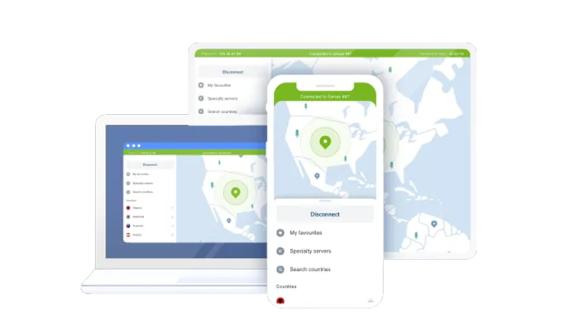
NordVPN (starting at $3.71 a month for 2 years; nordvpn.com)
NordVPN is ubiquitous among discussions of virtual private networks, and it’s one with which we’re very familiar. With more than 5,400 servers, availability on up to six devices and a user-friendly interface, it stands as a solid contender. However, despite having a strong server volume, it’s only available in 59 countries as opposed to ExpressVPN’s 94 — a considerably smaller amount of coverage. People from countries where Nord doesn’t host servers will have to connect to a server in nearby countries instead of their own, which will often result in slower internet speeds for those users. Plus, ExpressVPN is available on a greater variety of devices than NordVPN. ExpressVPN, for example, can be installed on the latest PlayStation and Xbox consoles, whereas NordVPN cannot. And while NordVPN can be installed on one more device than ExpressVPN, this does not compensate for the relative lack of variety.
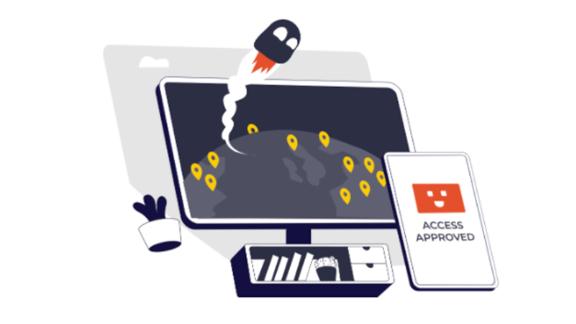
CyberGhost VPN
PHOTO:
CyberGhost VPN
CyberGhost VPN
CyberGhost VPN was shaping up to be a strong contender; the service has well over 7,000 servers in 90 different countries. It’s easy to use on up to seven different devices, available on as many devices as ExpressVPN and provides competitive internet speed. It even posts a quarterly transparency report on top of a no-logging policy. But upon further inspection, a few concerns arose in terms of the transparency and how its parent company handles personal information. When discussing these concerns with Shackelford, our cybersecurity expert, he advised we avoid recommending this VPN altogether; the security concerns involved simply don’t make the service worth the risk.
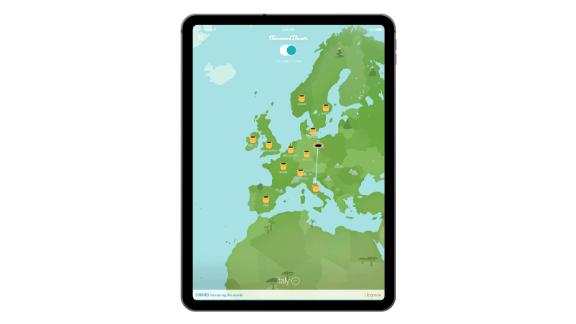
TunnelBear
PHOTO:
TunnelBear
TunnelBear (starting at $3.33 a month for 3 years; tunnelbear.com)
This small VPN, comically named TunnelBear, hosts a little more than 1,800 servers in just 23 countries. This is modest coverage at best, but TunnelBear did at least hold up in terms of internet speeds compared to a majority of the others we tested. You can also run it on the same amount of devices as ExpressVPN, though it is available on a narrower variety of devices. For example, TunnelBear does not cover Fire TV or Apple TV, whereas ExpressVPN does. You can try out the VPN for free with a maximum of 500MB of data per month, which is a unique way of running a free trial. Like ExpressVPN, TunnelBear reports a no-logging policy and subjects itself to an annual independent audit to put its service to an objective test.

ProtonVPN
PHOTO:
ProtonVPN
ProtonVPN (free with limited features, or $6.63 a month for 2 years on premium; protonvpn.com)
ProtonVPN hosts just over 1,060 servers at the time of writing, even fewer than TunnelBear. However, its servers are located in 54 different countries, making it competitive with NordVPN but short of ExpressVPN’s server volume and locations. Proton’s interface is also unique, displaying statistics about your session in real time, such as download and upload speeds. But what makes this service more unique are its various levels of membership from free up to “Visionary.” The free version covers just one device with connections to three countries, while Visionary covers 10 devices and holds no features back. We tried out the “Plus” version, which covers five devices with every feature available. But regardless of which plan you choose, you’re backed by an impressive security and privacy history. Specifically, an independent audit of the VPN service as well as open sourcing of all their apps. And though we love this privacy aspect, ExpressVPN offers similar protection with additional servers, server locations and device variety.
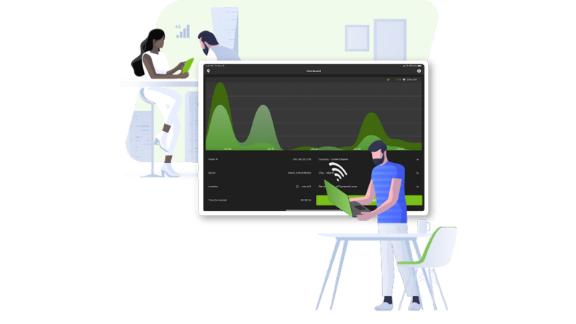
IPVanish (starting at $6.49 a month for 1 year; ipvanish.com)
Sometimes the programs we tested were a mixed bag, and IPVanish was one such case. This VPN service hosts more than 1,500 servers, one of the lowest server counts out of those we tested. But at the same time, these servers are located in 75 different countries, much more than Nord’s 59. Plus, you can download the VPN on an infinite number of devices. But while there’s no limit to downloads, there is an internet speed limit, as IPVanish provided a somewhat slower connection than that of others we tested. We were also not in love with its privacy options, which promised a no-logging policy without much to back up the claim.
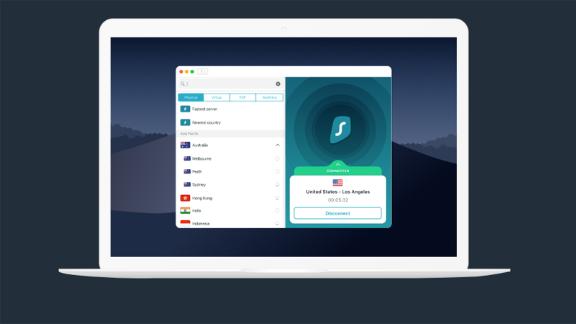
Surfshark VPN
PHOTO:
Surfshark VPN
Surfshark VPN (starting at $2.49 a month for 1 year; order.surfshark.com)
This two-year-old service hosts more than 1,700 servers in 63 different countries (a handful more than NordVPN). And like ProtonVPN, you can use Surfshark on an infinite number of devices, with a comparable variety to NordVPN, but fewer than ExpressVPN. Additionally, Surfshark subjected itself to an independent audit in 2018, including both browser extensions provided by the service. All in all, Surfshark VPN is a strong newcomer to the VPN world, and certainly one to keep an eye on.
Read more from CNN Underscored’s hands-on testing:
Read the Original Article HERE
The post Best VPNs 2020 | CNN Underscored first appeared on MetNews.
from MetNews https://metnews.pw/best-vpns-2020-cnn-underscored/
No comments:
Post a Comment